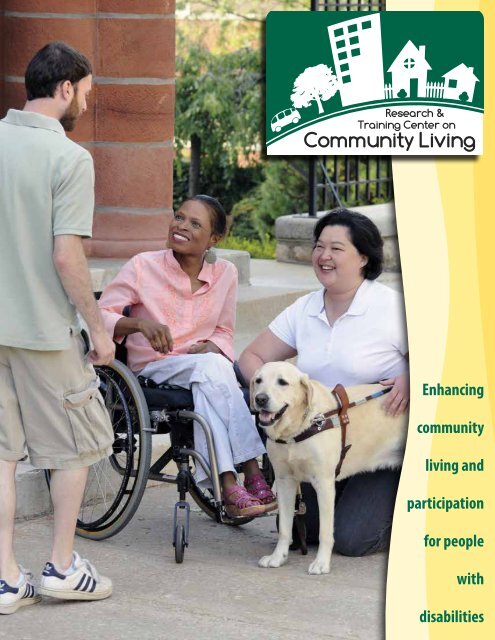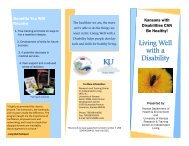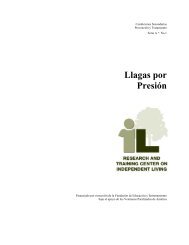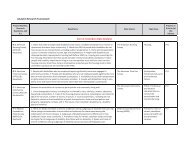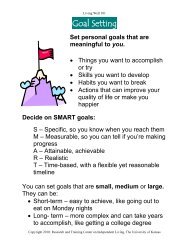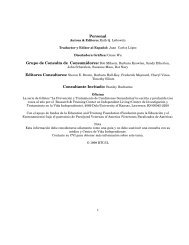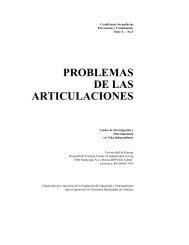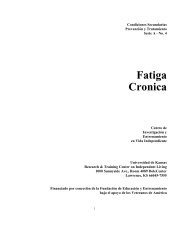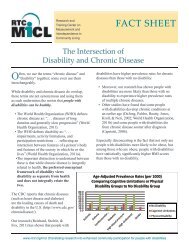Enhancing community living and participation for people with ...
Enhancing community living and participation for people with ...
Enhancing community living and participation for people with ...
You also want an ePaper? Increase the reach of your titles
YUMPU automatically turns print PDFs into web optimized ePapers that Google loves.
<strong>Enhancing</strong><br />
<strong>community</strong><br />
<strong>living</strong> <strong>and</strong><br />
<strong>participation</strong><br />
<strong>for</strong> <strong>people</strong><br />
<strong>with</strong><br />
disabilities
Our Mission<br />
The Research <strong>and</strong> Training Center on Community Living<br />
(RTC/CL) develops evidence-based programs, policies <strong>and</strong><br />
practices that further <strong>community</strong> <strong>living</strong> <strong>and</strong> <strong>participation</strong><br />
among <strong>people</strong> <strong>with</strong> disabilities.<br />
Why It Matters<br />
Americans <strong>with</strong> disabilities have the right to live in a<br />
<strong>community</strong> setting rather than in an institution. This was<br />
decided in the U.S. Supreme Court’s Olmstead v. L.C. decision<br />
in 1999.<br />
Since then, progress has been made toward the goal of<br />
<strong>community</strong> <strong>living</strong> <strong>for</strong> <strong>people</strong> <strong>with</strong> disabilities through<br />
de-institutionalization, anti-discrimination policies,<br />
<strong>community</strong>-based service providers <strong>and</strong> other<br />
systems of care.<br />
Yet <strong>people</strong> <strong>with</strong> disabilities still face many barriers to<br />
achieving enhanced <strong>participation</strong> <strong>and</strong> continuity in<br />
<strong>community</strong> <strong>living</strong>. The Research <strong>and</strong> Training Center on<br />
Community Living seeks to improve our underst<strong>and</strong>ing<br />
of those barriers <strong>and</strong> develop new ways to improve<br />
opportunities <strong>for</strong> <strong>community</strong> <strong>living</strong> <strong>and</strong> <strong>participation</strong>.<br />
The Research Projects<br />
RTC/CL research projects are designed to exp<strong>and</strong> our<br />
knowledge <strong>and</strong> develop new strategies to improve<br />
<strong>community</strong> <strong>living</strong> opportunities <strong>for</strong> <strong>people</strong> <strong>with</strong> disabilities.<br />
First, we must underst<strong>and</strong> the problem. How do a person’s<br />
age, economic status, place of residence <strong>and</strong> other personal<br />
factors influence his or her ability to live in the <strong>community</strong>?<br />
Six projects use secondary data, or existing in<strong>for</strong>mation,<br />
to analyze how barriers to <strong>and</strong> experiences of <strong>community</strong><br />
<strong>living</strong> may differ across socio-demographic <strong>and</strong> geographic<br />
groups.<br />
Next, building on this in<strong>for</strong>mation, five projects test<br />
interventions, or new strategies, that are designed to<br />
improve <strong>community</strong> <strong>living</strong> opportunities <strong>for</strong> individuals <strong>with</strong><br />
disabilities.<br />
These interventions focus on housing, health, recreation,<br />
personal assistant services, <strong>and</strong> civic involvement.<br />
In addition, we are gaining important in<strong>for</strong>mation that will<br />
help shape the interventions by analyzing recent research in<br />
this field.<br />
Stakeholder Benefits<br />
The goal of this research center is to discover <strong>and</strong> translate<br />
knowledge that allows consumers, advocates, service<br />
providers <strong>and</strong> policymakers to create <strong>and</strong> maintain greater<br />
opportunities <strong>for</strong> <strong>community</strong> <strong>living</strong> <strong>and</strong> <strong>participation</strong> of<br />
<strong>people</strong> <strong>with</strong> disabilities.<br />
We are committed to involving <strong>people</strong> <strong>with</strong> disabilities<br />
in our research so it is relevant to their lives. Consumerempowered<br />
teams provide advice <strong>and</strong> feedback to the<br />
researchers who lead the intervention projects. In addition,<br />
consumers on our Scientific <strong>and</strong> Consumer Advisory Panel<br />
provide input on all aspects of the center.
Core A<br />
Six projects analyze secondary data to<br />
build our knowledge base.<br />
R-1. Housing <strong>and</strong> Transportation Access analyzes data<br />
from the American Housing Survey. The purpose is to<br />
identify the proportion <strong>and</strong> demographic characteristics of<br />
<strong>people</strong> <strong>with</strong> disabilities who experience significant housing<br />
<strong>and</strong> transportation barriers.<br />
R-2.Time Use among People <strong>with</strong> Disabilities reviews<br />
American Time Use Survey data to underst<strong>and</strong> factors<br />
associated <strong>with</strong> <strong>community</strong> <strong>living</strong> among <strong>people</strong> <strong>with</strong><br />
<strong>and</strong> <strong>with</strong>out disabilities. The study considers how much<br />
time <strong>people</strong> spend in <strong>community</strong>-based activities (such<br />
as employment <strong>and</strong> recreation), where they go, <strong>and</strong> <strong>with</strong><br />
whom they engage in activities (<strong>for</strong> example, <strong>with</strong> coworkers<br />
versus alone).<br />
R-3. Relation of Socio-demographics <strong>and</strong> Local<br />
Characteristics to Community Participation/Living uses<br />
data from the American Community Survey to investigate<br />
the association of <strong>community</strong> <strong>living</strong> <strong>and</strong> <strong>participation</strong><br />
<strong>with</strong> a variety of factors. These include socio-demographic<br />
factors (race, income, education, etc.), the built housing<br />
environment, local public policies, <strong>and</strong> the nature of an<br />
individual’s disability.<br />
R-4. Multiple Chronic Conditions <strong>and</strong> Healthcare Access<br />
examines data from the Medical Expenditure Panel Survey<br />
to increase our underst<strong>and</strong>ing of the relationship between<br />
disability <strong>and</strong> chronic disease. The study focuses on common<br />
combinations of chronic conditions (or “comorbidities”)<br />
among four subgroups of <strong>people</strong> <strong>with</strong> disabilities.<br />
R-5. Does VR Effectively Support Community Living?<br />
studies the impact of vocational rehabilitation (VR) services<br />
on the <strong>community</strong> <strong>living</strong> of recipients. It uses six years of<br />
socio-demographic <strong>and</strong> geographic data from the State of<br />
Illinois to find the rehabilitation outcomes <strong>for</strong> three groups<br />
of VR consumers.<br />
R-6. Personal <strong>and</strong> Environmental Factors Influencing<br />
Community Living <strong>for</strong> People <strong>with</strong> Disabilities examines<br />
relationships between <strong>community</strong> <strong>living</strong> <strong>and</strong> <strong>participation</strong><br />
<strong>and</strong> environmental facilitators, including personal, healthrelated,<br />
geographic <strong>and</strong> impairment factors. It uses data<br />
collected through two measures, the Characteristics of<br />
the Respondent (CORE) <strong>and</strong> Survey of Participation <strong>and</strong><br />
Receptivity in the Community (SPARC).<br />
Core B<br />
Five intervention projects test ways to<br />
improve specific areas of <strong>community</strong> <strong>living</strong>.<br />
R-7. Health Navigator Training develops an intervention<br />
designed to improve the health of <strong>people</strong> <strong>with</strong> disabilities,<br />
which helps ensure their continuity of <strong>community</strong> <strong>living</strong> <strong>and</strong><br />
<strong>participation</strong>. The project will teach health navigator skills<br />
to center <strong>for</strong> independent <strong>living</strong> (CIL) case managers, who<br />
can then provide consumers <strong>with</strong> the skills to proactively<br />
manage their health.<br />
R-8. Development <strong>and</strong> Testing of an In<strong>for</strong>mal PA Training<br />
Program implements a training program <strong>for</strong> providers <strong>and</strong><br />
consumers of in<strong>for</strong>mal personal assistance (PA). The goal<br />
is to improve the knowledge <strong>and</strong> skills of in<strong>for</strong>mal care<br />
providers <strong>and</strong> consumers about how to avoid disruptions in<br />
<strong>community</strong> <strong>living</strong> <strong>and</strong> to enhance <strong>community</strong> <strong>participation</strong>.<br />
R-9. Fair Housing Compliance Assessment <strong>and</strong> Advocacy<br />
develops new advocacy methods that CILs <strong>and</strong> other<br />
disability advocates can use to enhance accessible housing<br />
stock. The project focuses on monitoring compliance <strong>with</strong><br />
<strong>and</strong> advocating <strong>for</strong> adherence to federal housing laws.<br />
R-10. Community Engagement Initiative Knowledge<br />
Transfer (KT) Project exp<strong>and</strong>s the Community Engagement<br />
Evaluation (CEE) project, a grassroots technique that was<br />
used to improve access to healthcare in our previous<br />
research center, RTC/MICL. This project has two goals: to<br />
assess the effcacy of the CEE method <strong>for</strong> improving access<br />
to recreation, <strong>and</strong> to assess effective knowledge transfer<br />
methods <strong>for</strong> using the CEE.<br />
R-11. Building Capacity <strong>for</strong> Full Community Participation<br />
works <strong>with</strong> CILs to create more opportunities <strong>for</strong> civic<br />
engagement <strong>and</strong> <strong>community</strong> <strong>participation</strong> <strong>for</strong> <strong>people</strong> <strong>with</strong><br />
disabilities. It tests an existing Community Participation<br />
Training <strong>and</strong> Technical Assistance program to determine if it<br />
helps CILs to more successfully bring about <strong>community</strong> <strong>and</strong><br />
systems change.<br />
Core C<br />
Two systematic scoping reviews of the<br />
research literature will help shape the<br />
Center’s interventions.<br />
SSR-1. A Systematic Scoping Review of the Literature on<br />
Risks <strong>for</strong> Institutionalization of People <strong>with</strong> Disabilities<br />
assesses the research <strong>and</strong> identifies gaps in it regarding<br />
barriers to remaining in the <strong>community</strong>. The study includes<br />
<strong>people</strong> <strong>with</strong> severe disabilities ages 18-65.<br />
SSR-2. Updating a Systematic Scoping Review of the<br />
Literature on Healthcare Use <strong>and</strong> Receipt of Clinical<br />
Preventive Services by People <strong>with</strong> Disabilities extends<br />
by two years a review that was conducted by the Disability<br />
<strong>and</strong> Rehabilitation Research Project on Health Disparities.<br />
The project identifies gaps in the literature regarding how<br />
persons <strong>with</strong> disabilities use clinical preventive services.
A project of the University of<br />
Kansas Research <strong>and</strong> Training<br />
Center on Independent Living<br />
(RTC/IL).<br />
RTC/IL<br />
University of Kansas<br />
4089 Dole, 1000 Sunnyside Ave.<br />
Lawrence, KS 66045-7561<br />
Ph 785-864-4095; TTY 785-864-0706<br />
E-mail rtcil@ku.edu<br />
Web www.rtcil.org/cl<br />
The Research Team<br />
The RTC/CL is a partnership based at the University of<br />
Kansas. Disability scientists from five universities bring their<br />
expertise to our mission.<br />
The University of Kansas<br />
Glen W. White, PhD, RTC/CL Director<br />
Martha Hodgesmith, JD, Associate Director<br />
Am<strong>and</strong>a Reichard, PhD, Research Director<br />
Dorothy Nary, PhD<br />
Jean Ann Summers, PhD<br />
Megan O’Brien, PhD<br />
Amalia Monroe-Gulick, MLS<br />
Jerry Schultz, PhD<br />
Christina Holt, MA<br />
Val Renault, MA<br />
University of Illinois at Chicago<br />
Fabricio Balcazar, PhD<br />
University of Montana<br />
Craig Ravesloot, PhD<br />
Tom Seekins, PhD<br />
University of New Hampshire<br />
Charles E. Drum, JD, PhD<br />
Andrew Houtenville, PhD<br />
Washington University in St. Louis<br />
David B. Gray, PhD<br />
Jessica Dashner, OTD, OTR/L<br />
Scientific <strong>and</strong> Consumer<br />
Advisory Panel<br />
This expert team of advisors brings an external perspective to our<br />
work, helping us keep the center’s research both rigorous <strong>and</strong><br />
relevant to the lives of <strong>people</strong> <strong>with</strong> disabilities.<br />
Scientific Representatives<br />
Tony Cahill, PhD - Director, Division of Disability <strong>and</strong> Health Policy,<br />
Center <strong>for</strong> Development <strong>and</strong> Disability, University of New Mexico,<br />
Albuquerque, NM<br />
Al Condeluci, PhD - CEO, United Cerebral Palsy, Pittsburg, PA<br />
Catherine Graham, MEBME - Rehabilitation Engineer, School of<br />
Medicine, University of South Carolina, Columbia, SC<br />
Margaret (Peg) Nosek, PhD - Executive Director, Center <strong>for</strong><br />
Research on Women <strong>with</strong> Disabilities, Baylor College of Medicine,<br />
Houston, TX<br />
Phillip Rumrill, PhD - Professor, Rehabilitation Counseling, Kent<br />
State University, Kent, OH<br />
Consumer Representatives<br />
Gwen Gillenwater- Executive Director, disAbility Resource Center,<br />
North Charleston, SC<br />
Linda Gonzales - Consultant, San Diego, CA<br />
Stan Holbrook - Executive Director, Three Rivers Center <strong>for</strong><br />
Independent Living, Pittsburg, PA<br />
Bob Michaels - Consultant, Tempe, AZ<br />
Jamie Simpson - Director of Accessibility & ADA Education,<br />
University of Kansas, Lawrence, KS<br />
Funding<br />
The RTC/CL is funded by the National Institute on Disability <strong>and</strong><br />
Rehabilitation Research (NIDRR), grant number H133B110006,<br />
U.S. Department of Education.<br />
U.S. Department of Education<br />
David Keer, Program Specialist


